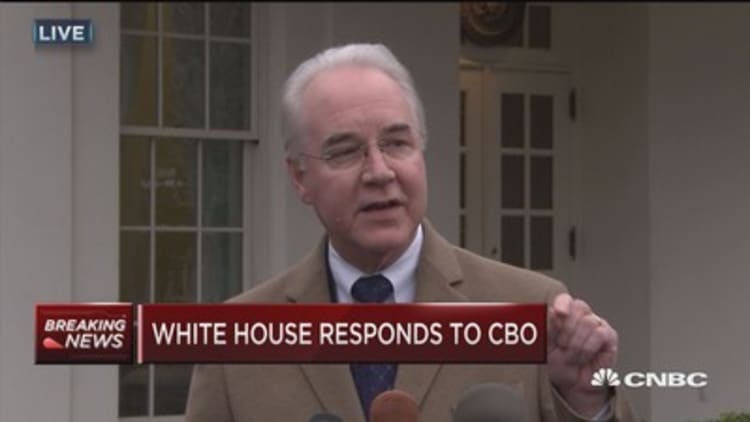
The Republican-backed American Health Care Act would be totally devastating to older Americans who rely on the individual market for insurance, according to an analysis by the Congressional Budget Office (CBO).
The bill does bring down overall premiums in the individual market by about 10 percent by 2026 compared with what they would be under current law, the CBO found. But the CBO includes a big caveat: This would greatly differ based on age and income.
The CBO offers an example of a single individual with an annual income of $26,500.
If that person is 21 years old, he'll largely benefit from the Republican health care bill. Under the Affordable Care Act (also known as Obamacare), he would on average pay $1,700 in premiums for insurance. Under the Republican plan, he would pay $1,450.
But if that person is 64 years old, he would be hurt by the Republican bill. Under Obamacare, he would also pay $1,700 in premiums for insurance. But under the Republican bill, he would pay $14,600 — more than half his annual income. That amounts to more than a 750 percent increase in premiums from Obamacare to the Republican bill.
More from Vox:
CBO estimates 24 million lose coverage under GOP plan. The devastating report, explained.
The GOP Obamacare replacement defunds Planned Parenthood and restricts abortion coverage
The GOP health plan is an act of class warfare by the rich against the poor
A 64-year-old who's making $68,200 a year would fare a bit better. Under Obamacare, he's expected to pay $15,300 in premiums for insurance — because his income would be too high to receive the law's tax credits. But under the Republican bill, everyone below $75,000 gets a tax credit based on age (with a phaseout for higher incomes). So he would get a subsidy that would reduce his premium to $14,600 — just barely enough to be lower than it would be under Obamacare.
Here's how all of that looks in chart form:
Older people with an annual income of $75,000 or more would get fewer to no subsidies under the GOP bill. So they would likely face higher premiums, much like the lower-income consumer.
The Republican bill accomplishes all of this in two ways.
First, it abandons Obamacare's income-based tax credits (which give more money to people with lower incomes) to instead give anyone with an annual salary below $75,000 a tax credit based on age, with older people getting more money and a phaseout for higher incomes.
But it also peels back an Obamacare rule that protects older people from higher premiums. Under Obamacare, insurers are generally only allowed to charge an older person about three times what they would charge a younger person — under the theory that older people are often sicker and therefore need to use more insurance. But under the Republican bill, the limit of three times would go up to five times, effectively letting insurers charge older people 66 percent more than they would under Obamacare.

Republicans argue this is necessary because it would also let insurers charge younger people less, which would encourage younger and generally healthier people to come into the insurance pool — and therefore bring down the overall cost of health care by making it so more younger, healthier people are effectively subsidizing everyone's care.
The CBO found that's broadly true. It would bring insurance premiums down in general, and it would cost young people less to get signed up for a health plan. But it would do all of that at a high cost for older Americans.

